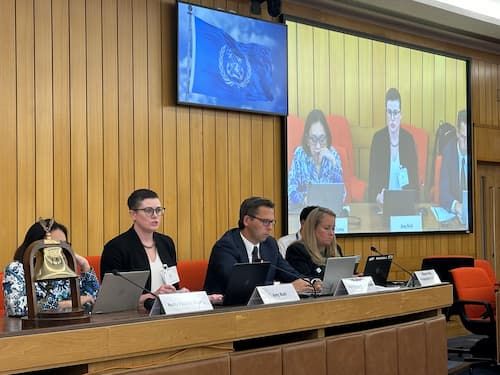Addressing Extreme Weather Challenges: Insights from the WMO-IMO Symposium
At the 2nd WMO-IMO Symposium on Extreme Maritime Weather, Weathernews highlighted its commitment to safety and innovation. Discussions focused on advanced forecasting, public-private partnerships, and the impact of climate change on maritime operations and risk management.

The recent 2nd WMO-IMO Symposium on Extreme Maritime Weather provided a crucial platform for discussing the evolving challenges in marine forecasting, particularly in light of climate change. Our presentation, led by Amy Buhl, General Manager (EU and US), Marine Group Operations at Weathernews, Inc., highlighted Weathernews' commitment to safety and innovation, drawing on nearly four decades of experience in maritime weather and climate risk management.
A Commitment to Safety
The maritime industry's history includes tragedies linked to inadequate weather information. One significant example is the 1970 incident in Fukushima, Japan, where an explosive low-pressure system sank a cargo vessel, resulting in the loss of 15 lives. This event illustrated the urgent need for reliable weather data. Since its inception in 1986, Weathernews has focused on ensuring the safety of seafarers, encapsulated in our mission to "help out in times of need."
Enhancing Public-Private Partnerships
During the symposium, we explored how collaboration between private and public sectors enhances weather services. A significant example comes from Japan, where regulatory changes in 1993 empowered private companies to provide certified weather forecasts. For our role within the larger Weather Enterprise, Weathernews is also engaged with the academic sector. Our US-based Operations office is located on the University of Oklahoma research campus, and is engaged with the School of Meteorology, School of Computer Science and research entities such as the Advanced Radar Research Center to collaborate to adapt emerging technologies to support our customer's needs by applying the latest innovations in weather research. This collaboration between government agencies, academic entities, and private providers like Weathernews is crucial to improving the reach and reliability of maritime weather data, which in turn helps operators make better decisions at sea.
Climate Change and Marine Forecasting
The impact of climate change on weather forecasting is profound and increasingly urgent. According to the latest report from the International Panel on Climate Change, extreme weather events are becoming more frequent and intense, resulting in unexpected occurrences that complicate forecasting efforts. Rising sea surface temperatures are linked to the rapid intensification of tropical cyclones, making them more dangerous and difficult to predict. For instance, Hurricane Beryl, the first storm of the 2024 season, exhibited unprecedented rapid intensification, with wind speeds increasing by 55 knots in just 24 hours. Such rapid changes in weather patterns present significant challenges to the maritime industry, necessitating enhanced forecasting capabilities.
The Growing Challenge of Accurate Weather Forecasting
Recent studies suggest that as global temperatures rise, the window of forecast accuracy is shrinking. With each degree of warming, the time frame for reliable weather predictions decreases, leading to greater uncertainty in forecasting. This evolving landscape of weather risk compels us to rethink how we manage and mitigate these risks.
Enhancing Forecast Accuracy: Observations and Models
At Weathernews, our goal is to develop the most accurate forecasts available. We utilize a variety of inputs, including satellite data, upper air observations, and surface measurements, to create a comprehensive picture of the atmosphere. This data is integrated with global forecasting models from agencies like NOAA and the Japan Meteorological Agency. To improve forecast accuracy, we employ post-processing schemes that refine our models, particularly in regions where global models may struggle. Our proprietary observation infrastructure, including nearly 6,000 daily ship reports and additional aircraft observations, enables us to assimilate real-time data into our forecasts, enhancing model initialization and accuracy.
Understanding Forecast Uncertainty
While accurate forecasts are essential, understanding forecast uncertainty is equally critical for effective risk management. Weather forecasts inherently carry uncertainties due to factors such as incomplete atmospheric descriptions and the chaotic nature of weather systems. To navigate these uncertainties, Weathernews employs ensemble forecasting, generating multiple model outputs by varying initial conditions. This approach allows us to quantify the probability of various weather scenarios, empowering maritime operators to make informed decisions based on a more comprehensive understanding of potential risks.
Probabilistic Forecasting in Voyage Optimization
Applying probabilistic forecasting to voyage optimization allows us to assess risks associated with specific weather conditions. For instance, by analyzing the probability of wave heights exceeding certain thresholds, we can identify regions that may pose increased risks to vessel safety. Our SeaNavigator Route Search Engine leverages this probabilistic data, providing users with route options accounting for various risk tolerances.
Strategic Decision-Making for Decarbonization and Safety
The nature of weather risk is changing due to climate change, and so must our approaches to managing it. As we adapt to these challenges, our probabilistic forecasting capabilities enable strategic, data-driven decision-making. By understanding forecast probabilities, maritime operators can optimize routes and make informed choices about resource allocation, ultimately supporting vessel safety and decarbonization targets.
Conclusion
The 2nd WMO-IMO Symposium reaffirmed the vital role of non-governmental weather service providers like Weathernews in addressing the challenges posed by extreme maritime weather and climate change. As we continue to innovate and improve our forecasting technologies, our commitment to enhancing safety and supporting the maritime industry remains unwavering. Investing in data-driven insights and collaboration will help us build a more resilient future for the maritime industry.
Check us out at
- Oct 22 - Oct 24 • Milan, Italy
Enlit Europe

- Oct 24 - Oct 24 • New York, US
2024 Annual Conference and Marine Environment Protection Awards

- Nov 6 - Nov 7 • Montreal, Canada
Arctic Shipping Summit

- Oct 16 - Oct 16 • Galveston TX, US
US Nautical Institute Conference

- Oct 10 - Oct 10 • Athens, Greece
Digital Ship Athens (Autumn Forum)

- Oct 2nd - Oct 2nd • Limassol, Cyprus
1st CSN Mediterranean Energy Efficiency and Sustainability Conference

- Sep 23 - Sep 26 • London, UK
2nd WMO-IMO Symposium on Extreme Maritime Weather

- Sep 24 - Sep 26 • Hamburg, Germany
WindEnergy


Key Insights from Limassol: Addressing Energy Efficiency and Sustainability for Shipowners
In Limassol on the 2nd of October, Weathernews engaged with maritime leaders on alternative fuels, sustainability, and energy efficiency. Key discussions highlighted the industry's shift towards greener practices and the regulatory landscape shaping the future of shipping and environmental responsibility.
Read more
Key Takeaways from WindEnergy Hamburg 2024: Advancements in Offshore Energy
WindEnergy Hamburg 2024 highlighted significant advancements in offshore wind energy, focusing on sustainability, risk management, and technology integration. Weathernews, represented by Daniel Røtzer, engaged with industry leaders to explore emerging trends and collaborative opportunities.
Read more
Enhancing Maritime Safety: Weathernews' Role in Navigating Extreme Weather Challenges
Weathernews is invited to the 2nd WMO-IMO Symposium on Extreme Maritime Weather, where Amy Buhl will discuss the role of private sector innovations in maritime safety, focusing on advanced forecasting and risk management strategies.
Read more